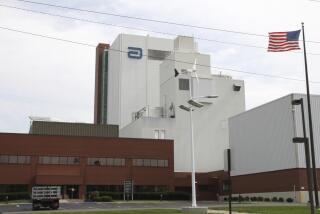Where’s the children’s Tylenol?
- Share via
The drugstore shelves for children’s analgesics and other over-the-counter liquid medications are conspicuously bare these days, the result of disturbing shortcomings federal investigators found at a Johnson & Johnson plant. The corporation’s pharmaceutical division, McNeil Consumer Healthcare, which makes such pediatric staples as infants’ and children’s Tylenol, Motrin and Benadryl, has recalled about 50 versions of its products. Its Pennsylvania plant, where the problems were found, has closed operations altogether for the time being.
An inspection report released this month by the U.S. Food and Drug Administration outlined a panoply of violations found during an April inspection. The plant wasn’t adequately testing the components of its medicines, the FDA said. And when it changed the process for one of its infant Tylenol products, it failed to check that the new procedures were working correctly. The result: Some batches had 24% more of the product’s active ingredient than they were supposed to. Potentially bacteria-contaminated materials were used to make the medications. There were dusty and dirty areas.
Worst, perhaps: The company had received dozens of customer complaints over the course of 10 months about dark specks in some of its liquid formulas, but failed to investigate properly. Ultimately, the FDA found that the specks were tiny bits of metal from some machinery.
The FDA says the chances of anyone being harmed by the recalled products are remote. But the conditions uncovered by the agency are inexcusable in a modern U.S. drug-making facility. It sounds more like the scandals in Chinese plants that have outraged the American public. And the April inspection was prompted by a history of other McNeil problems, including a series of recalls from this and other plants. Among them was a December 2009 recall of Tylenol arthritis medicine made at the company’s Puerto Rico facility.
There had been dozens of complaints from consumers in that case as well, about a moldy smell in the medication and gastrointestinal upset after taking it, beginning in spring 2008. According to an FDA warning letter to the company, McNeil initially suspected microbial contamination, but when tests were negative, it closed its investigation and failed to notify the FDA about the problem until September 2009. The problem was later found to be contamination from a chemical used to treat the wooden pallets on which the medication was shipped.
While it continues its investigation, the House Committee on Oversight and Government Reform will hold a hearing Thursday on the McNeil lapses. Clearly, a company that managed to do so much wrong on so many fronts needs to hit the stop and restart buttons on its operations if it is to regain public trust. At minimum, the committee and the FDA should require McNeil to pay for full-time, round-the-clock outside inspectors at its facilities in a federally mandated revamp of both its procedures and its apparently cavalier attitude toward the safety of vulnerable customers.
More to Read
Inside the business of entertainment
The Wide Shot brings you news, analysis and insights on everything from streaming wars to production — and what it all means for the future.
You may occasionally receive promotional content from the Los Angeles Times.










